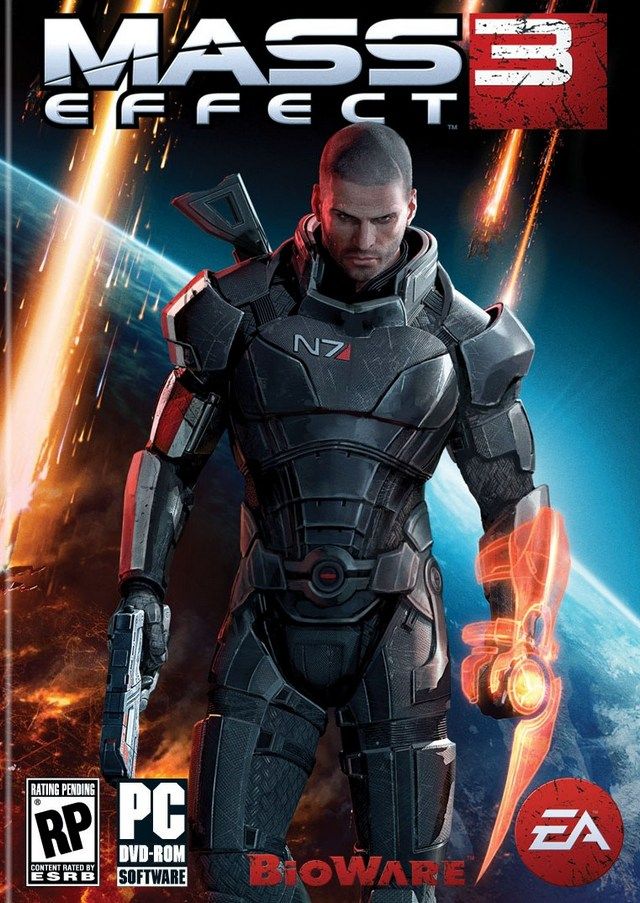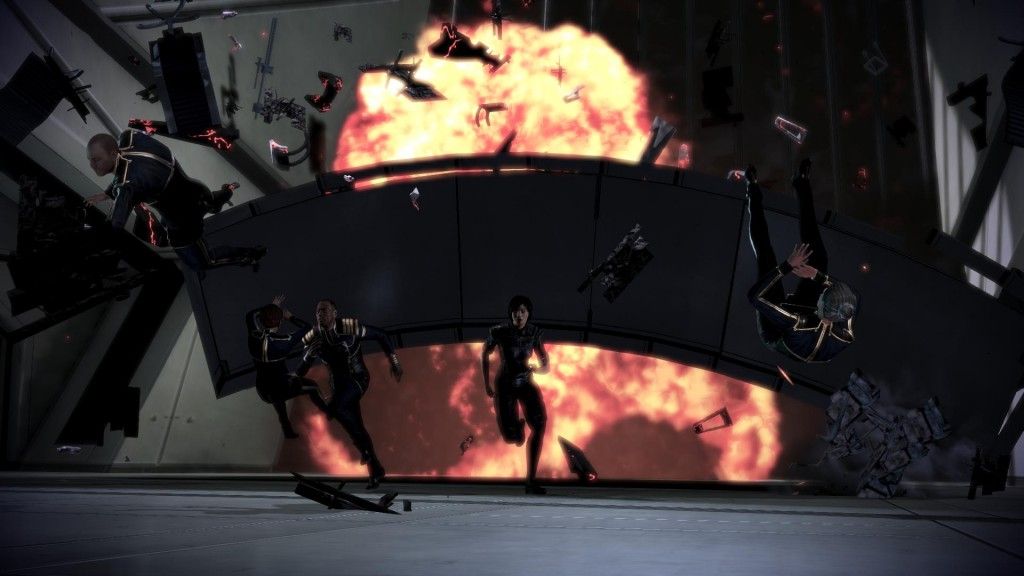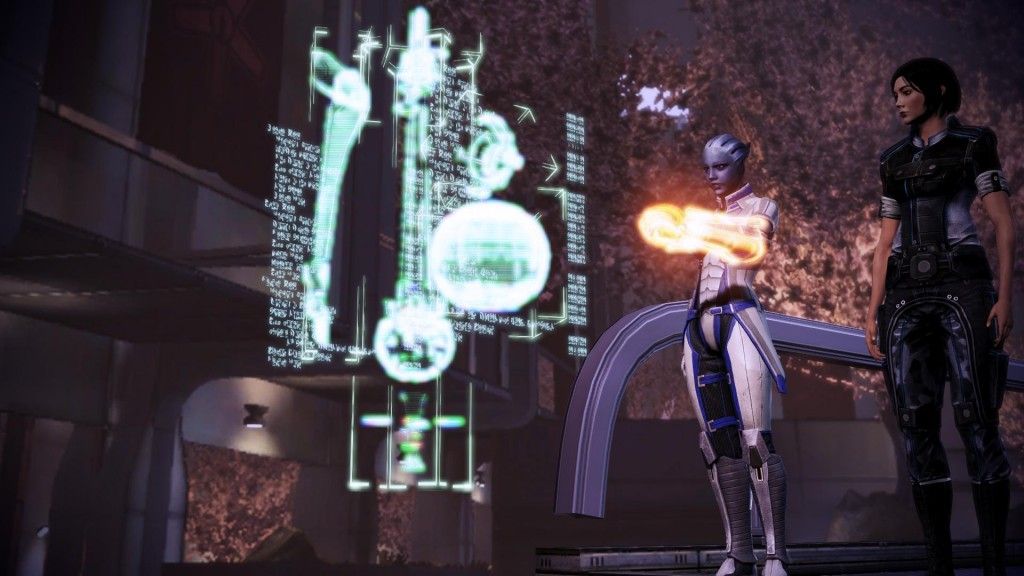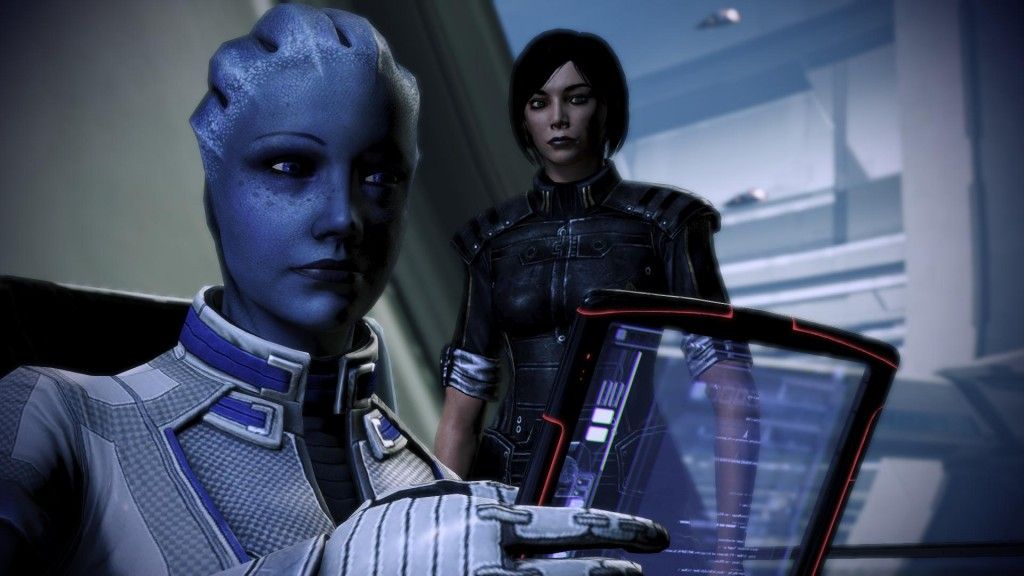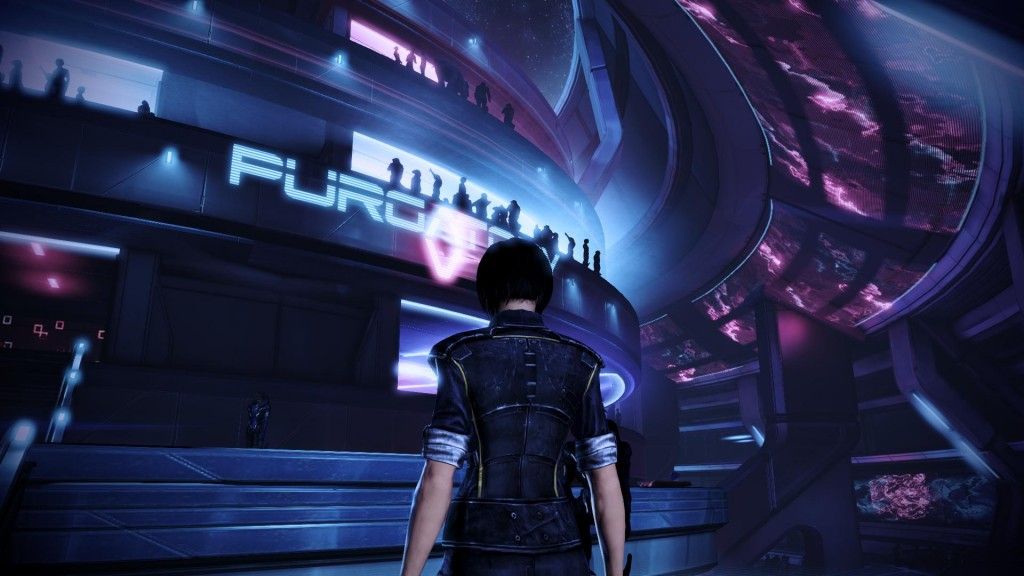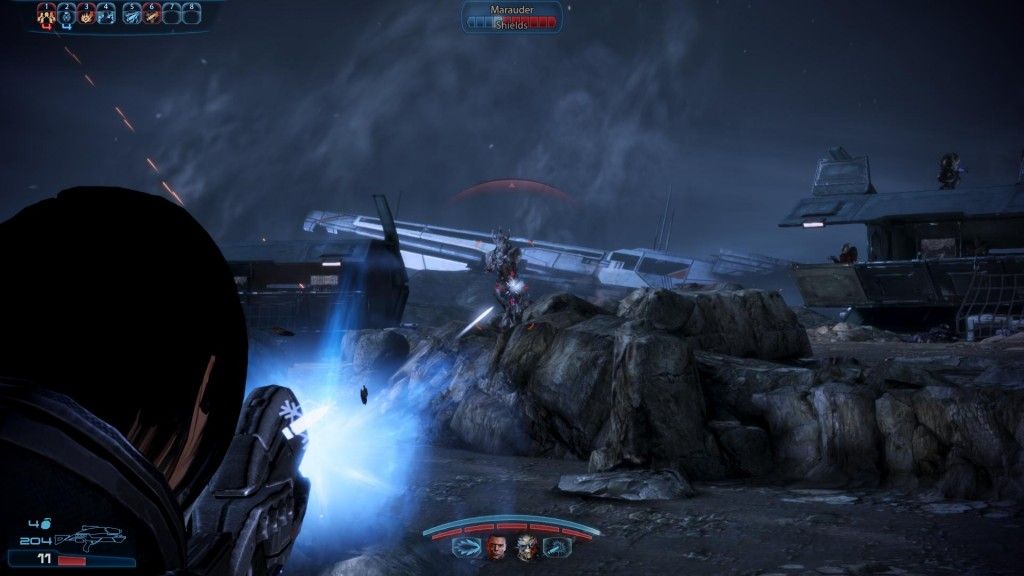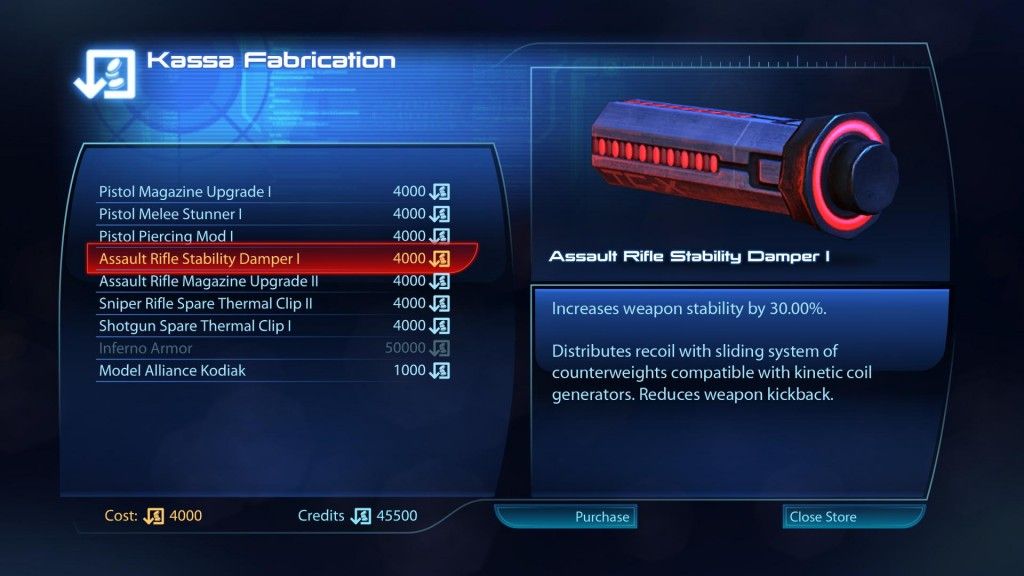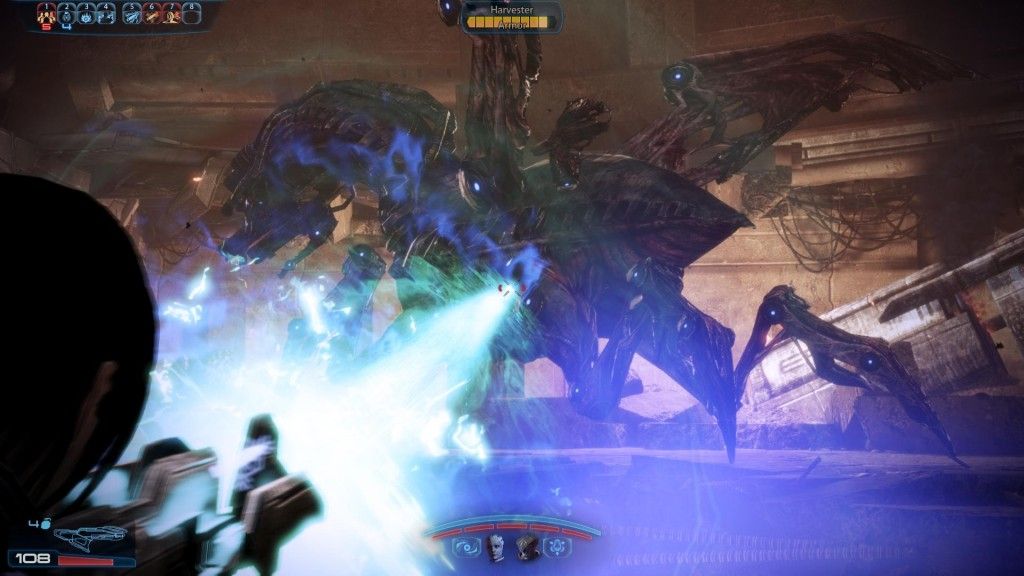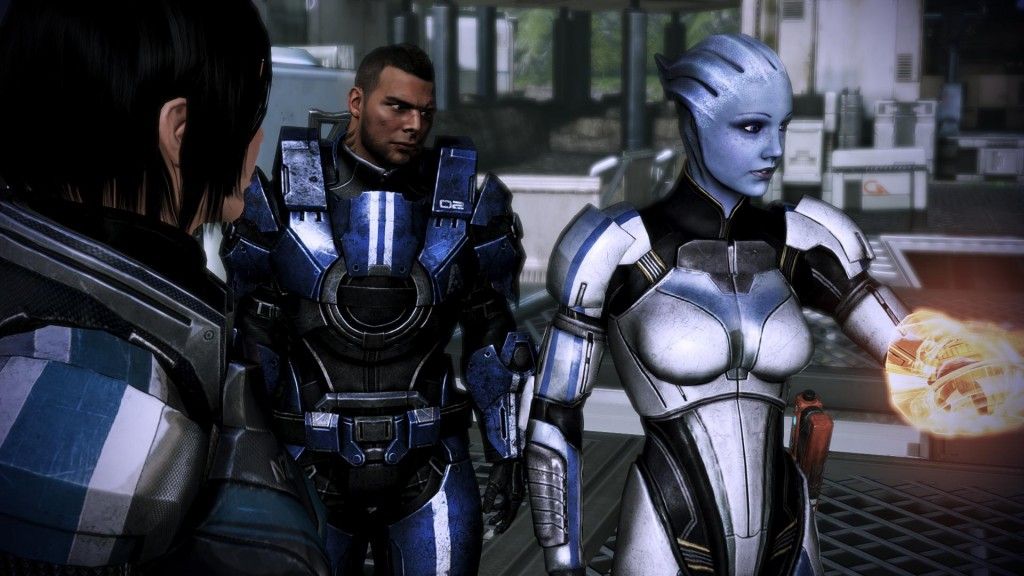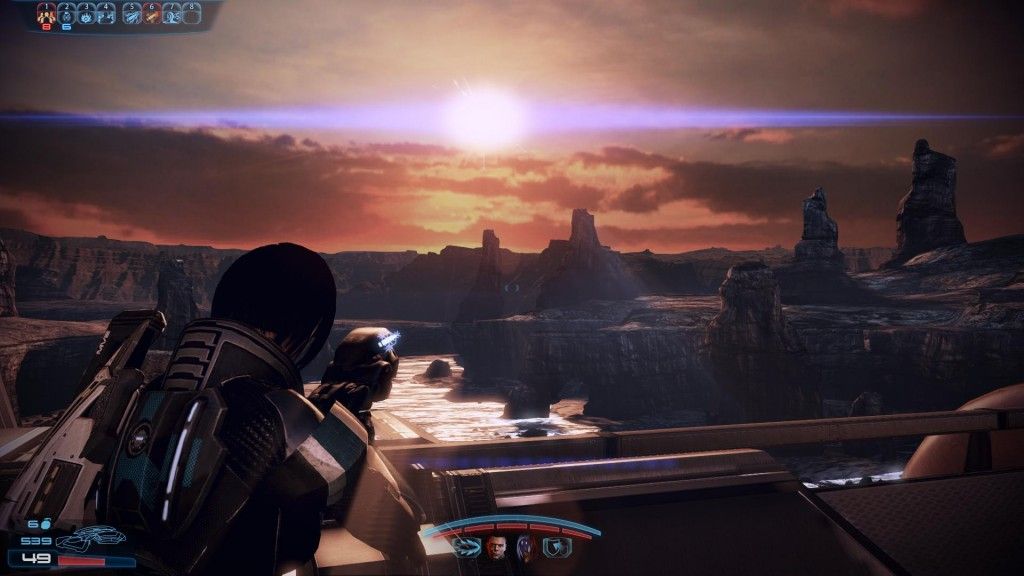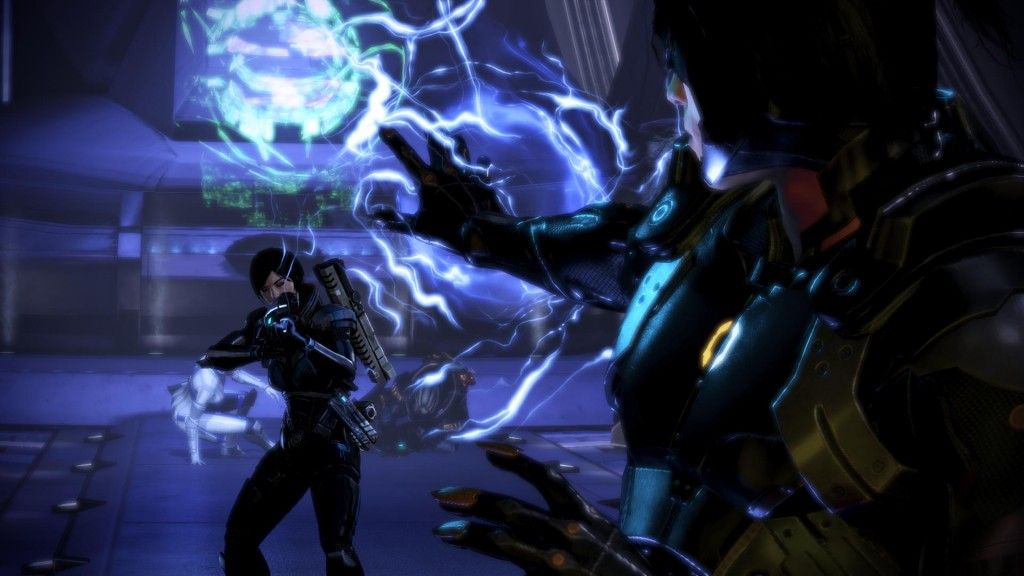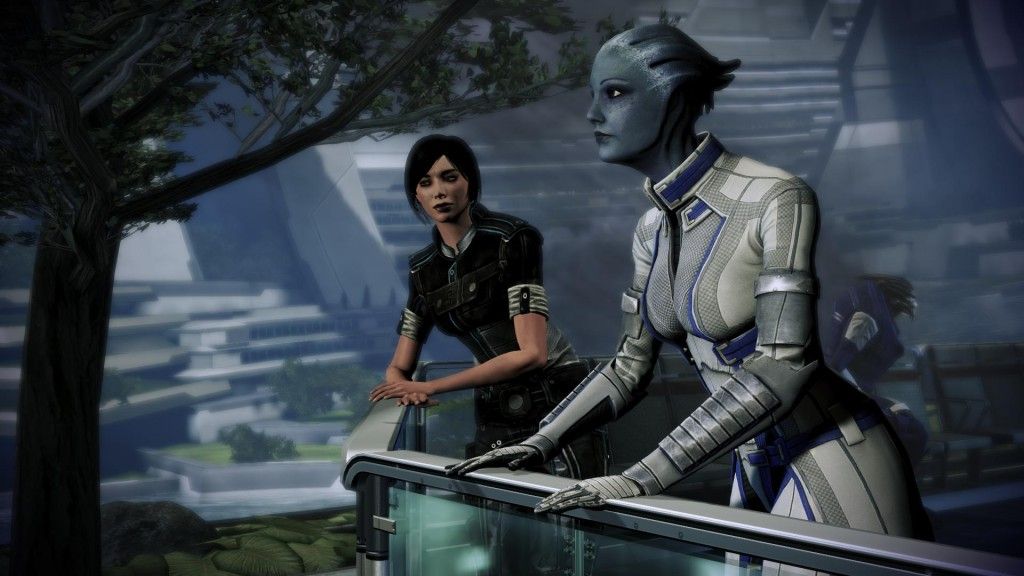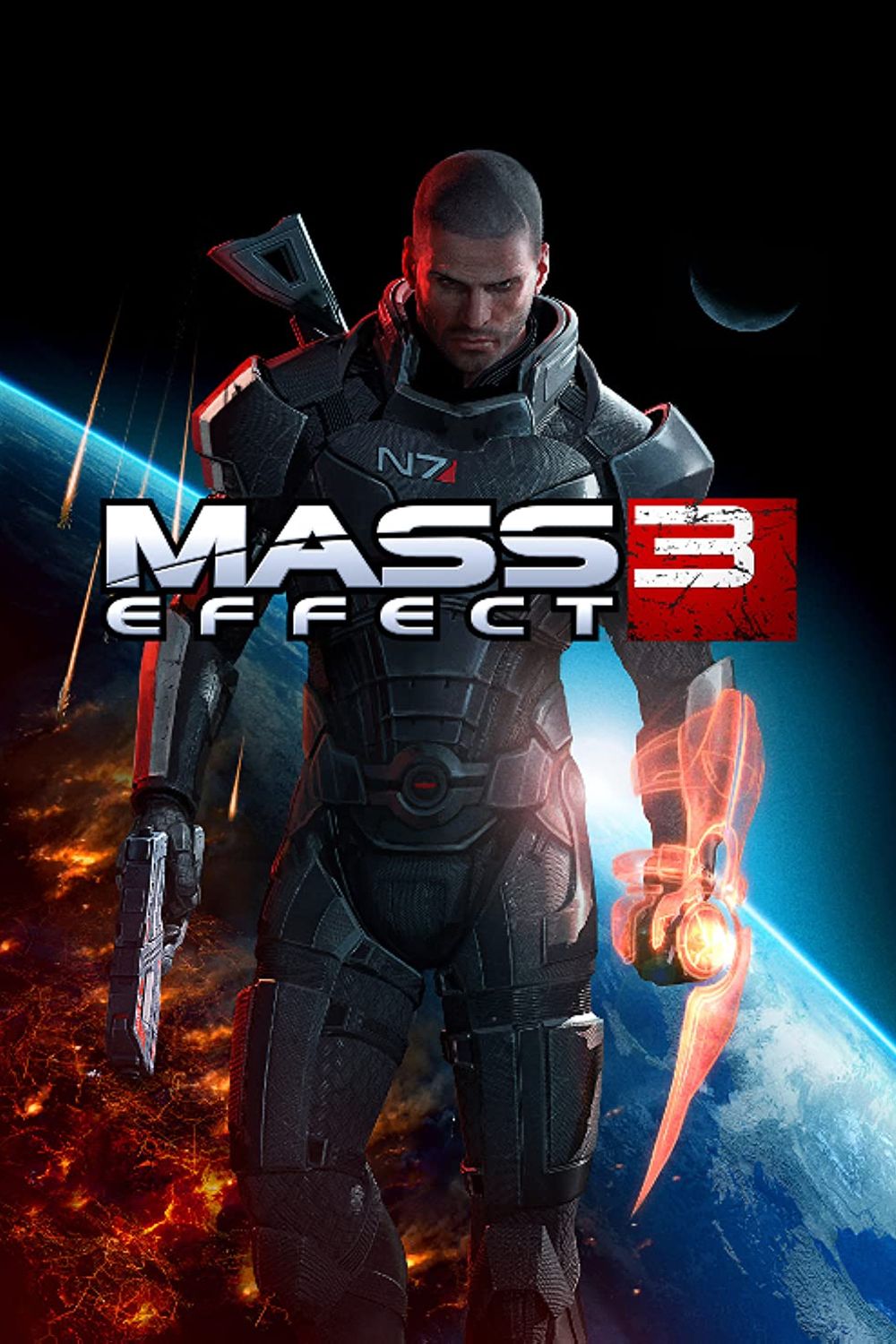The time has finally arrived – for the first time in the entire Mass Effect franchise we get to visit Earth. Unfortunately, we get to see but a glimpse of the human homeworld before it’s smashed to pieces by the Reapers, as they descend from the sky in fiery claws of death and destruction. In many ways, this is the end of an “era”, so to speak. It’s the final ounce of effort to toss the One Ring into Mount Doom or the last galactic battle in Return of the Jedi. Just like those moments, a lot is riding on Mass Effect 3 – not only the fate of the galaxy in Sheperd’s universe, but also the way the story will forever be thought of in our own.
Does this final tale in Commander Sheperd’s story surpass its prequels, or do things not quite wrap up the way we envisioned? No, I’m not talking about the ending.
The game starts off with a bang, which brings the inevitable Reaper invasion – which Sheperd has been warning people of for years – home as the ancient race of mechanical beings descend upon Earth, killing millions and sending the entire human civilization into defense mode. One of the most important things here to note – and in a rather odd move by BioWare – is, if you had played Mass Effect 2with no extra DLC, you will probably notice a disconnect between the ending events in that game and the opening of this one. In fact, some dialog would be highly confusing to you, I would think.
Of course, any Mass Effect fan will likely have played The Arrival DLC for the previous title, which is a nice segue into the third game, and, in fact, there is quite a lot of dialog that rests on any DLC from the previous game, but most notably The Shadow Broker and The Arrival. I would find it unfortunate if you’re jumping into the franchise with the third game, not having the background with the characters or events that are unfolding, even here in the early moments of Mass Effect 3.
With that said, it is most notably the story and the character relationships that carry this game. This isn’t to say that the other parts of it – such as the combat – are lackluster. That is surely not the case at all. At its core, Mass Effect 3 and, indeed, the whole franchise, relies very heavily on its story components and it does an excellent job of melding everything together from the two previous games and this third one. Looking back at the trilogy as a whole, it does feel like one combined, cohesive unit that could be played through from start to finish without even knowing they were three separate games that span years of development time and release schedules. That all comes to a head in Mass Effect 3and is perhaps the game’s largest achievement.
The first two areas of the game hopefully draw you in, but it’s the rest of the story that has to hold you there. In a way, I think the developers might have gone overboard with the hype train as far as what to expect. In my opinion, before Mass Effect 3, the second game was basically the pinnacle of this franchise, it was quite nearly the perfect game. It had the perfect amount of linearity and the perfect amount of freedom. To me, it felt like ME3 restricted that freedom somewhat. In the previous game, what opened up to you was multiple (more than two) paths to take to continue the main story. Some were optional, others were not. In ME3the main story itself feels more linear. There is a time or two where you are given the choice of which main story mission to attack first, but it’s nothing like the vast decisions you have to make in the previous two titles. To me, this seemed a bit more restrictive, but only as the main story in concerned.
The side missions are actually much improved because, finally, they meld into the main story nearly seamlessly and some even rely on and build off of main story missions, which I like. That admiral you hear about in passing that went down on another part of the planet becomes a new mission once you clear the mission you’re on. All the smaller side missions connect you back to the main war effort because you’re briefed before and after by one of the council members or by an admiral himself.
Therein lies the biggest change as far as mission rewards go, you’re actually accumulating more than crew members, credits, minerals or goodwill by all these side missions. Instead of some barely tangible accolades that don’t do much good in the overall scheme of things, by completing each and every side mission, you add to your war assets. Just about everything you do in the game – from talk to and side with various random people on the Citadel to complete high-risk side missions to make the tough decision in the main story – adds to your arsenal of war assets, which leads to the defining moment at the end of the game.
I absolutely love the way the focus isn’t so much the story itself, but the interpersonal relationships that tie us all together. This game in particular, because there’s a massive war going on, focuses many times on the small, seemingly insignificant things in the world, then makes you realize, even if not intentionally, that those are the things in our lives that really matter. The conversations you can engage in between Joker and Edi, the R&R with Garrus at the “top” of the Citadel, sitting in a café on the Citadel speaking with Liara, helping Jacob secure his dream of having a family, helping Tali deal with the death of her father, assisting Samara as she tries to reunite with her daughters. None of these things have any bearing on the war effort at all (aside from added assets, depending on your choices), yet they focus on the things that are really important and what we’re all fighting for in the context of the game. At least, that’s what I took away from it.
Related to the story is the variety of locations you visit. I was a smidge disappointed here. While it was nice to see various homeworlds that we haven’t seen before in the series (such as the gorgeous Rannoch), I missed having multiple “hub” locations like we had in Mass Effect 2. I enjoyed being able to hop back and forth between the Citadel, Omega and Illium in the previous game. In fact, nothing in ME3 impressed and awed me as much as Illium did. There just wasn’t that “wow factor” in any other locations (aside from maybe later in the game on Thessia).
In Mass Effect 3, your one and only hub is the Citadel, and it felt a bit underwhelming (although it was awesome to finally get to see a lot of the Presidium, even more than in the first game). Another example is Purgatory, which is a very mediocre homage to Afterlife on Omega. The latter got my blood pumping as soon as I walked into the entrance hallway with the flames lighting up the bulkheads. The former, on the Citadel in Mass Effect 3, took away just about everything I enjoyed from the previous game. Perhaps I just like the gritty nature of going rogue and off the grid with Cerberus, as opposed to the structured life in the core systems?
Aside from the story, which is clearly the highlight, many of the game mechanics themselves haven’t changed a whole lot. If you’re familiar with pointing and shooting in Mass Effect 2, you’re going to be right at home here. There are a few changes in the realm of cover that you should be aware of, and most of them make transitioning from one cover location to another rather seamless. You can sneak around corners, roll between cover locations and, finally, double-tap the space bar to hop obstacles instead of having to get into cover first.
Melee combat has improved quite a bit, as well, with multiple levels of damage being done. I never was much of a melee player, as I usually find it clunky and hard to manage, but it is a bit improved here. Your characters’ powers also go up to higher ranks than before, granting you six levels of any given skill, with two branching power upgrades to choose from in the last couple levels.
Weapons have gone through a massive overhaul, as well. You can now upgrade them via mods, so if there’s that particular sniper rifle you’re rather fond of and don’t want to give it up for something that might be better, you can just mod it to squeeze all the life out of it that you can. Weapon mods can be purchased in shops or acquired during missions. Weapons are now found rather liberally throughout missions, as well as other places around the galaxy. This adds a lot of customization to the game as a whole, but I found that spending too much time getting the perfect mod for your weapons was counterproductive. You’re supposed to be out saving the galaxy, not tinkering with your weapons for 15 minutes after every mission. It even seemed to get to the point where it didn’t matter if my weapons were modded or not, it wasn’t really affecting gameplay a whole lot.
There are a couple other notes I have to make about the single player experience. First off, I’m disappointed they removed hacking completely. Now Sheperd just sits there using her omni-tool and “hacks” doors open, and claiming loot from lockers or other areas is just instantaneous. This, to me, removes an element that makes getting into said door or locker fun, making you feel like you’ve accomplished something. However, it is a pretty minor detail, I’m just unsure why it was removed in the first place.
Secondly, while I’m all for multiple difficulty levels, Mass Effect 3 takes that to the next extreme with different ways to play through the game. It actually bothers me more than I like to admit that they added in a mode where players can focus on the combat and not the story, where the choices are made for them. To me, it’s the hard choices that make this game, such as the choices you have to make at the end of the various acts, as well as near the end of the game. Without that, this game would be just another third-person shooter like Gears of War.
I’m ultimately unsure why they chose to neuter their amazing, choice-filled story by catering to those who just want to shoot things. That isn’t what this game is about. While it would be asinine to take off points in this review for BioWare giving more of a variety in choices to fit just about any gamer, I do feel that, in this case, they may be doing everyone a disservice by allowing that option.
Mass Effect 3, for the first time in the franchise, has multiplayer now. To be perfectly honest, I’m still not sure why it’s needed. Oh, wait, I know – because multiplayer is a “must have” these days, otherwise points get taken off the review score, right? I kid, I kid. Sort of.
While I may not be a fan of multiplayer in my single-player experiences, it is done very well here. The overall gist of multiplayer is that you take up arms as a regular, ol’ soldier around the galaxy, defending yourself from either Cerberus, the Geth or the Reapers themselves. While that does fit in very well with the overall story, I would have liked to see a little more individualization of that story. If they would have allowed any races to be available from the start and designed a story that your character goes through around the multiplayer, much like group content in Star Wars: The Old Republic, that would have elevated the multiplayer in ME3from pretty good to absolutely outstanding.
They could have perhaps even brought your multiplayer character into the single player at certain points to connect the two stories in the minds of the players. Unfortunately, nothing that great took place. The multiplayer component, as it stands, aside from the overall story of why you’re fighting, seems to just drop you in the middle of a firefight and lets you have at shooting things in the face. It felt a bit disjointed and disconnected from the story simply because there was very little story told during the multiplayer component.
You’re typically faced with many waves of enemies, grouped up with a small squad of four team members. The idea here is to survive, plain and simple. It works pretty well considering that you’re used to this kind of thing during the main story campaign. Except, this time you’re not playing as Sheperd and you can’t select the difficulty, so things may seem a bit more intense, even if you’re playing through the main campaign on normal.
Once you survive the waves of mobs, you then have to defend the landing zone until your team is extracted. There are other minor objectives that spice things up from time to time, and multiplayer does add to your overall war asset rating for the single-player game, but other than that, in my opinion, it got pretty boring pretty quickly, especially when the “elitist” components come into play with people kicking you from your group just because you aren’t near the same rank as they are. My preference? Ignore the multiplayer component altogether and stick with the traditional Mass Effectexperience. Your time with the game will still be super amazing and you won’t put yourself through the frustration of it all.
Overall, Mass Effect 3 is an outstanding game, although it does fall short of the near perfection of the previous title just because I think BioWare both tried to do too much with it and hyped it up more than was needed. There are some amazing moments, but much of it felt simply like more of a massive expansion to Mass Effect 2 than an entirely new game, even though the story content was on a top-notch level.
I hope people remember that this entire franchise is focused on the journey. The journey to discover, the journey to fight, the journey to form relationships and friendships, and the journey to realize what’s most important in difficult times. The story is not about the ending, because if the ending is all you want, then you might as well just jump to the last page in the book, so to speak, and skip the countless amazing hours that come before it.
This Mass Effect trilogy is a must play for any RPG fan and gamer in general, and the final game in the franchise, as far as the story goes, is just as amazing as the first. It truly is a new sci-fi blockbuster that isn’t gracing a theater screen but, instead, your gaming platform of choice. Regardless what else anyone says, this is one amazing journey that I will both miss and enjoy time and time again in the future. While some things tended to take a slight slide backward from the previous title, overall the package is still one amazing achievement in both storytelling and electronic entertainment and something not to be missed by anyone.

